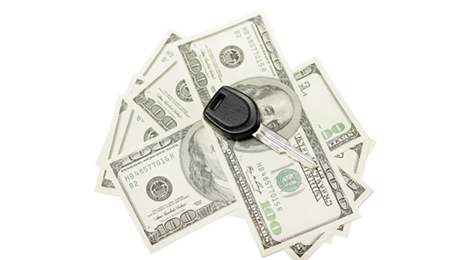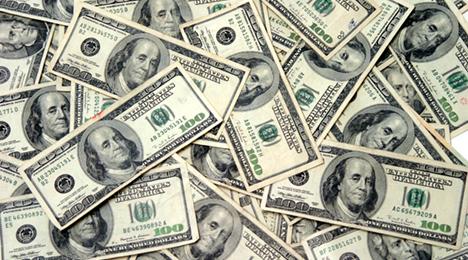While the subprime sector produced positive results, Fitch Ratings reported losses for U.S. prime auto loan ABS ticked up in May, but overall asset performance remains “solid.”
Fitch indicated that 60-day delinquencies in the prime space crept 7 percent higher in May to 0.30 percent on a monthly basis. But analysts said those delinquencies are within 2013 levels — just 3.4 percent higher.
The firm noticed annualized net losses were virtually unchanged at 0.24 percent in May versus 0.22 percent in April. The rate was elevated versus May of last year, but Fitch explained this situation stemmed from the second lowest record rate of 2013 established that month at 0.17 percent.
“In short, asset performance is strong in 2014 and improved versus the solid pre-recession 2005-2006 period,” Fitch said.
“Auto ABS recovery rates were stable over the first five months of the year and continue to be supported by the ongoing strength in wholesale vehicle values in May, which were 5 percent above a year earlier despite rising supply coming into the market this year,” analysts continued.
Fitch moved along in its latest update by stating the subprime sector posted “solid” results in May, “as losses came down while delinquencies stayed relatively stable.”
Analysts determined subprime 60-day delinquencies ticked up to 2.67 percent month-over-month in May but settled 3 percent below the rate recorded in May of last year.
Fitch also mentioned annualized net losses in subprime posted an unexpected 11 percent decline month-over-month to 3.48 percent in May. The rate was 10 percent better than a year earlier.
“Solid consumer demand, low interest rates, stable vehicle incentive levels and healthy new-vehicle pricing all combined to support wholesale values in May,” analysts said.
“Manufacturers appear to be conscious of over production in 2014 and staying in step with consumer demand for autos, which Fitch views as a positive seeing as used vehicle supply rise in 2014 over 2013 levels,” they went on to say.
Fitch also pointed out that what it described as solid new-vehicle pricing combined with flat incentive spending in May had a positive knock-on effect on used-vehicle values.
“This is a sign of consumers still looking for bargains in the market and thus looking to cheaper used vehicles,” analysts said.
“Used-vehicle sales in 2014 have risen over 2013 levels and may be on track for a record this year, according to Manheim Consulting, which bodes well for auto ABS as demand stays healthy,” they went on to say.
Fitch wrapped up its latest report by mentioning that ratings performance so far this year is easily outpacing that of 2013. Fitch issued 36 upgrades through late June of this year, double the rate of 18 in 2013.
“The rating outlook for the prime sector is positive for 2014, and Fitch expects positive rating actions to continue throughout the year,” analysts said.
Fitch’s indices track the performance of $74.9 billion of outstanding prime and subprime auto ABS, and 63 percent of the index is comprised of prime auto ABS, and the remaining 27 percent subprime auto ABS.
This week, Consumer Portfolio Services announced the closing of its second term securitization of the year. The company highlighted the transaction is CPS’ first senior subordinate securitization to receive a triple A rating on the senior class of notes.
In the transaction, qualified institutional buyers purchased $202.5 million of asset-backed notes secured by automobile receivables purchased by CPS.
The sold notes, issued by CPS Auto Receivables Trust 2014-B, consist of five classes. Ratings of the notes were provided by Standard & Poor’s and Moody’s and were based on the structure of the transaction, the historical performance of similar receivables and CPS’ experience as a servicer.
| Note Class |
Amount |
Interest Rate |
Average Life |
Price |
S&P Rating |
DBRS Rating |
| A |
$141.2 million |
1.11% |
1.26 years |
99.98834% |
AA- |
AAA |
| B |
$26.8 million |
2.32% |
3.04 years |
99.99202% |
A |
A |
| C |
$18.7 million |
3.23% |
3.70 years |
99.98909% |
BBB |
BBB |
| D |
$10.1 million |
4.62% |
3.99 years |
99.96686% |
BB |
BB (high) |
| E |
$5.6 million |
5.85% |
3.99 years |
99.99235% |
B+ |
B (high) |
The company indicated the weighted average effective coupon on the notes is approximately 2.37 percent.
Officials also noted the 2014-B transaction has initial credit enhancement consisting of a cash deposit equal to 1.00 percent of the original receivable pool balance.
The final enhancement level requires accelerated payment of principal on the notes to reach overcollateralization of 4.00 percent of the then-outstanding receivable pool balance.
The transaction utilizes a pre-funding structure, in which CPS sold approximately $131.4 million of receivables this week and plans to sell approximately $71.1 million of additional receivables during July. This further sale is intended to provide CPS with long-term financing for receivables purchased primarily in the month of June.
“The transaction was a private offering of securities, not registered under the Securities Act of 1933, or any state securities law. All of such securities having been sold, this announcement of their sale appears as a matter of record only,” officials said.
Fitch Ratings determined delinquencies on prime U.S. auto loan ABS reached another record low in April, with the subprime sector posting a strong improvement, too.
Analysts indicated the movements mean that asset performance is positioned for a strong summer.
According to the latest monthly results from Fitch, auto loan ABS losses and delinquencies declined in April “due largely to lower unemployment and healthy used-vehicle values over the past couple of months.”
Fitch expects prime and subprime auto loan ABS asset performance to remain stable during the summer.
“Though losses for both prime and subprime auto loans will creep higher, they will stay comfortably within range of levels exhibited during the strong 2005-2006 period,” analysts said.
Fitch’s prime 60-day delinquency index hit a new record low of 0.28 percent in April, down 10 percent from March and 3.4 percent below April of last year. The prior record low was 0.29 percent in spring last year.
Analysts noted prime annualized net losses recorded the second month of double-digit improvement, hitting 0.22 percent in April, the lowest level since June of last year and 29 percent lower than March. The rate also was 8.3 percent better than in April of last year.
In step with the prime sector, Fitch noticed subprime 60-day delinquencies sank 10 percent to 2.51 percent, a 6-percent improvement over the same period a year ago. The April rate was the lowest level since April 2012 when it settled at 2.33 percent.
Analysts mentioned subprime annualized net losses came in at 3.89 percent in April, down 22 percent from March and marking a 5-percent improvement from a year earlier.
Fitch tabulated the U.S. added 288,000 jobs in April “picking up steam following the cold winter months which were a drag on economic output and growth.” The U.S. unemployment rate dropped to 6.3 percent in April down from 6.7 percent in March. The rate was the lowest level since September 2008.
Used-vehicle values rose 5 percent year-over-year in April, notching the fourth consecutive month of improvement as recorded by the Manheim Used Vehicle Value Index.
“Fitch does expect used vehicle values to soften in the remaining months of 2014 with increased off-lease volumes coming into the market, among other factors, and recovery rates should moderate but still be strong overall,” analysts said.
Fitch upgraded 34 classes of auto loan ABS notes through May of this year, versus the 18 issued during the same period in 2013. Of these 34 upgrades, 21 subordinate note upgrades were issued on prime auto loan ABS transactions and the remaining 13 were on subprime transactions.
“The rating outlook remains positive for the remainder of 2014,” analysts said.
Exeter Finance Corp. announced this week that EFCAR — a special purpose Delaware limited liability company and wholly owned subsidiary of the Exeter — priced $500 million in aggregate principal amount Series 2014-2 automobile receivable backed notes.
The company indicated the notes will be issued in four separate tranches.
The class A notes were rated AAA/AA by DBRS and Standard & Poor’s, respectively, while the remaining three tranches were rated A, BBB and BB by both agencies.
On a blended basis, Exeter mentioned the average annual coupon of the notes is approximately 2.64 percent.
Officials added the notes have final scheduled distribution dates ranging from Aug. 15, 2018 through Dec. 15, 2020.
Upon closing of the transaction, Exeter said the net proceeds from the sale of the Series 2014-2 notes will be applied to reduce borrowings outstanding under the company’s existing three-year, $1.075 billion warehouse financing facility.
The offering is expected to close on May 28.
Citigroup and Wells Fargo Securities acted as joint bookrunners on the transaction, with Deutsche Bank Securities and Goldman, Sachs & Co. participating as co-managers.
Along with giving executives another opportunity to complete the first module of its compliance certification program, the National Automotive Finance Association is rolling out one of its best lineups ever for its annual conference later this month.
The NAF Association acquired 25 percent more conference space to accommodate more programs, sessions and expansion of the exhibit hall for the 18th annual Non-Prime Auto Financing Conference, which begins on May 28 at the Omni Fort Worth Hotel in Fort Worth Texas.
“In keeping the primary focus on member needs, the 2014 annual conference will provide an excellent forum for education and networking for those within the non-prime auto finance sector. This highly regarded conference will cover the hot topics pertinent to the industry along with results from the newly formatted NAF Association Survey,” NAF Association executive director Jack Tracey said.
Among some of the conference agenda highlights:
—Consumer Financial Protection Bureau Q&A: This session is built on questions submitted in advance by NAF Association members. Members’ questions will be compiled, and Rick Hackett, partner with Hudson Cook and former CFPB assistant director will pose the questions to CFPB executives Jeffrey Langer, assistant director, office of installment and liquidity lending markets, and Eric Reusch, office of installment and liquidity lending markets.
—Auto Industry Lending Through the Eyes of a Leading Industry Expert: Attendees of this session will hear observations on auto industry financing from leading industry professional, Sandy Schwartz, president of Manheim and the Auto Trader Group. His views will provide a perspective on how the cyclical swings in financing affect the auto industry at large.
—Subprime Forecast: Revving Up Your Approach to Auto Loan Portfolio Evaluation: Presented by Steve Chaouki, executive vice president of strategy and planning at TransUnion, this session cover how the sector has experienced significant growth since 2010, with strong demand pushing manufacturers to production capacity limits. One of the consequences of this dynamic has been the appreciation of used vehicle values, which in turn has led to a positive equity position on many auto loans. TransUnion’s study quantifies the impact of positive equity on the risk propensities of auto loans, controlling for a series of risk factors related to both the borrower and the loan collateral. Through analysis, Chaouki will show how the presence of positive equity leads to a meaningful reduction of credit risk under certain conditions, and how lenders can leverage this insight to optimize their portfolio management, collections and capital reserve policies.
— Asset Backed Securitization: An Update on Recent Developments and Trends: Presented by Amy Martin, senior director at Standard and Poors this session will focus on the current market trends in non-prime financing. This session will provide information on issuance volume and pricing spread; collateral and ratings performance and Standard and Poor’s outlook for the auto loan ABS market.
Before the conference begins, the NAF Association is repeating the opening segment of its compliance certification program due to strong demand. The association had an overflow crowd when it conducted the training back in January so Tracey decided to hold another session in Fort Worth this month.
The NAF Association offers an exceptional certification program including:
—35 hours in-classroom and online self-paced courses
—In-depth coverage of federal laws and regulations
—Thorough analysis of state laws and regulations
—Complete module devoted to CFPB
“A critical part of a compliance management system is staffing it with qualified compliance personnel. A company having their compliance officers certified through a comprehensive educational program is a clear demonstration of the importance the organization places on compliance,” Tracey said.
Certification participants will be eligible to attend the remaining sessions of the Non-Prime Auto Finance Conference for $195.
For complete details of the conference and the compliance certification program, visit www.nafassociation.com.
After what analysts classified as a few speed bumps, U.S. auto ABS is primed for a strong spring as seasonal trends kick in, according to the latest monthly index results from Fitch Ratings.
Analysts indicated prime and subprime annualized net losses sank 37 percent and 28 percent on a monthly basis in March, respectively.
“Strong seasonal patterns kicked in and should position the auto ABS sector for solid asset performance in the spring months,” Fitch said.
“March’s loss rates were within range of record lows recorded in the 2012-2013 period. Performance is also benefitting from the continual improvement in the U.S. economy while healthy used-vehicle values have been stronger in recent months,” analysts continued.
Fitch reported prime 60-day delinquencies declined 21 percent month-over-month to 0.61 percent through the first quarter. The firm noted annualized net losses declined to 0.31 percent in March, down from 0.49 percent in February. Both indices settled 6 percent below the levels recorded a year earlier in 2013.
Analysts highlighted similar improvements were evident in the subprime sector.
Fitch noticed 60-day subprime delinquencies dropped 100 basis points to 2.80 percent through March, marking a 7-percent improvement compared to March of last year. The latest information also showed annualized net losses declined to 4.96 percent, which was 6 percent below the same period in 2013 and the lowest level since September last year when it was 4.84 percent.
“Loss severity on defaulted and repossessed vehicles has been contained in recent months from strength in demand and values of used vehicles,” analysts said.
Fitch backed up that assessment by mentioning the Manheim Used Vehicle Value Index produced three months of consecutive improvements, rising to 124.4. This movement represents a 2.2-percent increase from the close of 2013 and is 3.3 percent higher than March of last year.
“Stronger used vehicle values support higher recovery rates in auto loan ABS,” analysts reiterated.
On the ratings front, Fitch reported positive ratings actions in 2014 have outpaced 2013 levels through the first three months. Upgrades of outstanding subordinate notes in 2014 totaled 18 through March, up 39 percent over the number issued in the first three months of 2013.
Despite rising turmoil surrounding its handling of recalled vehicles with faulty ignition switching, Fitch Ratings does not expect to change the rating status of asset-backed securities connected to General Motors.
Currently, Fitch has GM listed as BB+ with the automaker’s outlook as positive
Analysts pointed to a specific reason why no change is on the horizon even though GM said last week the recall is expected to cost the company $1.3 billion during the first quarter.
“We believe the company’s cash flow and cash position will allow it to weather these challenges,” Fitch analysts said. “As of the latest recall announcement, the total estimated cost of the recalls announced in March and April swelled to $1.3 billion, while GM held $38 billion in liquidity at year end. However, over the long run, the recall may result in reputational damage that could result in a sales decline.”
Although the expected cost of the recalls is significant, Fitch indicated GM’s existing liquidity and cash flow-generating potential provide sufficient financial flexibility to cover the costs and still maintain a strong liquidity position.
As of the close of 2013, analysts calculated GM’s automotive liquidity stood at $38 billion, including $28 billion in cash and cash equivalents and $10 billion of revolver availability.
“In Fitch’s view, the greatest negative outcome of the recalls could be on GM's reputation and increase the potential for sales to slip for an extended period,” Fitch analysts said.
The firm recapped that GM’s U.S. sales in March rose 4.1 percent year-over-year. That figure was a little below the overall market rise of 5.6 percent, but not out of line with other volume manufacturers, “suggesting the sales impact has been muted so far,” according to Fitch.
Analysts also reiterated that many of the recalled vehicles are older models that are out of production, which may help minimize the impact on current vehicle sales.
“Also, the very large number of recalls announced by other manufacturers in recent weeks, including Toyota and Nissan, may somewhat temper consumers’ view of the GM recalls,” Fitch said.
Fitch wrapped up its latest update on GM by touching on another problem GM faces.
“A large number of lawsuits, including class action suits, have been filed against GM related to the recalls. These could potentially drag on for years and create some additional risk for the company,” Fitch said.
“As many involve prepetition claims, the situation is complex and will require GM to effectively balance its legal obligations with its reputation in the market,” the firm went on to say. “The lawsuits are also likely to force management to focus on rectifying legacy issues at a time when it needs to continue to move the company forward.”
GM is facing continued pressure from U.S. lawmakers to ground all of the recalled vehicles until they can be repaired. The latest report on the activities associated with chief executive officer Mary Barra is available here.
Prestige Financial Services announced today that it completed its 12th and largest rated term securitization. The company hit the mark by issuing $390 million in securities backed by $396,383,511 in automobile installment receivables.
In a transaction led jointly by J.P. Morgan Securities and Wells Fargo Securities, Prestige indicated notes were purchased by qualified institutional buyers in a private offering pursuant to Rule 144A of the Securities Act. The securitization closed on Wednesday.
Officials highlighted the six note classes carried ratings ranging from A-1+/R-1(h) through BBB/BBB(h) from Standard & Poor’s and DBRS, respectively, based on several factors including Prestige’s proven track record as a loan originator and servicer. The weighted average rate was 1.69 percent
“Prestige continues to make great progress with its securitizations, and investor interest was extremely strong on this deal,” said John Cho, Managing Director at J.P. Morgan Securities.
“We received orders that totaled more than four times the available bonds, and Prestige was able to improve its pricing differential against other prominent names in the industry,” Cho continued.
Prestige was founded in 1994 as an affiliate of the Larry H. Miller Group of Companies, which includes the NBA’s Utah Jazz and the country’s 10th-largest dealership network.
Today, Prestige manages a loan portfolio of nearly $800 million and does business with approximately 2,000 dealerships in 46 states.
“While we knew that our bankers’ expertise would help us get the best execution possible, we hadn’t fully anticipated the enthusiasm with which investors would respond to our offering,” Prestige president Bryant Henrie said. “This occasion calls for simple gratitude on our part, as well as a commitment to redouble the efforts that earned this show of support.”
All notes included in this transaction having been sold, Prestige added that this announcement of their sale appears as a matter of record only.
There now is a much larger pool of funds to underwrite contracts for Toyota’s most fuel-efficient vehicles.
Today, Toyota Financial Services issued what the company believes is the industry’s first-ever asset-backed green bond in the amount of $1.75 billion. Officials highlighted the offering was upsized from $1.25 billion to accommodate demand as institutional investors demonstrated strong interest in this inaugural clean transportation investment opportunity.
The company pointed out the green bond is the newest component of TFS’ broad-ranging funding program and serves to enhance Toyota’s green commitment.
Proceeds of the TFS green bond will be used to fund new retail finance contracts and lease contracts for Toyota and Lexus vehicles that meet specific criteria, including powertrain, fuel efficiency and emissions. There are currently nine vehicles in the Toyota and Lexus portfolio of green vehicles that qualify.
“Investors have enthusiastically welcomed the industry's first Green Bond from Toyota Financial Services as a sign of our company's commitment to environmentally friendly transportation,” TFS chief executive officer Mike Groff said.
“The green bond itself represents the innovation that TFS brings to the financial marketplace in creating asset-backed investments that reflect the values of our company. This, in turn, enables us to provide Toyota customers with attractive financing options for their vehicles,” Groff continued.
To develop the green bond, TFS worked closely with Citi, which has a long-standing relationship with TFS and shares its commitment to green innovation. Citi served as the structuring lead manager of the bond, and BofA Merrill Lynch and Morgan Stanley acted as joint-lead managers.
Officials reiterated their claim that the TFS green bond is the first of its kind in the industry and enhances Toyota’s leadership reputation for green innovation. Toyota currently offers hybrid editions in nearly all of its vehicle categories.
At the end of 2013, Toyota’s global sales of hybrids reached more than 6 million vehicles. The latest million-unit milestone was achieved in the fastest time yet for Toyota, taking just nine months.
Since the launch of the first Prius in 1997, officials determined Toyota’s hybrid vehicles have resulted in approximately 41 million fewer tons of carbon-dioxide emissions than would have been emitted by gas-powered vehicles of similar size and driving performance.
Tyler Dickson, global head of capital markets origination at Citi, said, “We see excellent investment opportunities for the growing interest among investors and consumers alike in environmentally friendly, energy efficient, clean transportation. The marketplace is eager for these investments and Citi is proud to work with Toyota to issue innovative deals like the TFS green bond.”
TFS will commit to use the proceeds of the Green Bond toward the purchase of retail finance contracts and lease contracts for Toyota and Lexus vehicles that meet high green standards as established by three criteria:
— Gas-electric hybrid or alternative fuel powertrain
— Minimum EPA estimated MPG (or MPG equivalent for alternative fuel vehicles) of 35 city / 35 highway
— California Low-Emission Vehicle II (LEV II) certification of super ultra-low emission vehicles (SULEVs) or higher, which would include partial zero emissions vehicles (PZEVs) and zero emissions vehicles (ZEVs)
Qualifying models from Toyota include: Prius, Prius c, Prius v, Prius Plug-in, Camry Hybrid, Avalon Hybrid, and RAV4 EV. From Lexus, qualifying vehicles are CT 200h and ES 300h.
For more information on TFS’ capital markets programs, visit www.toyotafinancial.com. For more information about Toyota’s commitment to the environment, visit www.toyota.com/about/environmentreport2013.
This week, Consumer Portfolio Services announced the closing of its first term securitization of the year. The transaction is CPS’ 12th senior subordinate securitization since the beginning of 2011.
In the transaction, qualified institutional buyers purchased $180 million of asset-backed notes secured by automobile receivables purchased by CPS.
The sold notes, issued by CPS Auto Receivables Trust 2014-A, consist of five classes.
The company highlighted ratings of the notes were provided by Standard & Poor’s and Moody's and were based on the structure of the transaction, the historical performance of similar receivables and CPS’ experience as a servicer.
| Note Class |
Amount |
Interest Rate |
Average
Life
|
Price |
S&P Rating |
Moody's Rating |
| A |
$128.7 million |
1.21% |
1.26 years |
99.99012% |
AA- |
Aa3 |
| B |
$20.7 million |
2.40% |
3.04 years |
99.99433% |
A |
A1 |
| C |
$16.6 million |
3.29% |
3.64 years |
99.97855% |
BBB |
Baa2 |
| D |
$9.0 million |
5.11% |
3.99 years |
99.98850% |
BB+ |
Ba3 |
| E |
$5.0 million |
6.38% |
3.99 years |
99.99128% |
B+ |
B2 |
Officials noted the weighted average effective coupon on the notes is approximately 2.51 percent.
CPS explained the 2014-A transaction has initial credit enhancement consisting of a cash deposit equal to 1.00 percent of the original receivable pool balance. The final enhancement level requires accelerated payment of principal on the notes to reach overcollateralization of 5.00 percent of the then-outstanding receivable pool balance.
The transaction utilizes a pre-funding structure, in which CPS sold approximately $111.2 million of receivables today and plans to sell approximately $68.8 million of additional receivables during April.
“This further sale is intended to provide CPS with long-term financing for receivables purchased primarily in the month of March,” company officials said.
“The transaction was a private offering of securities, not registered under the Securities Act of 1933, or any state securities law,” they continued. “All of such securities having been sold, this announcement of their sale appears as a matter of record only.”












